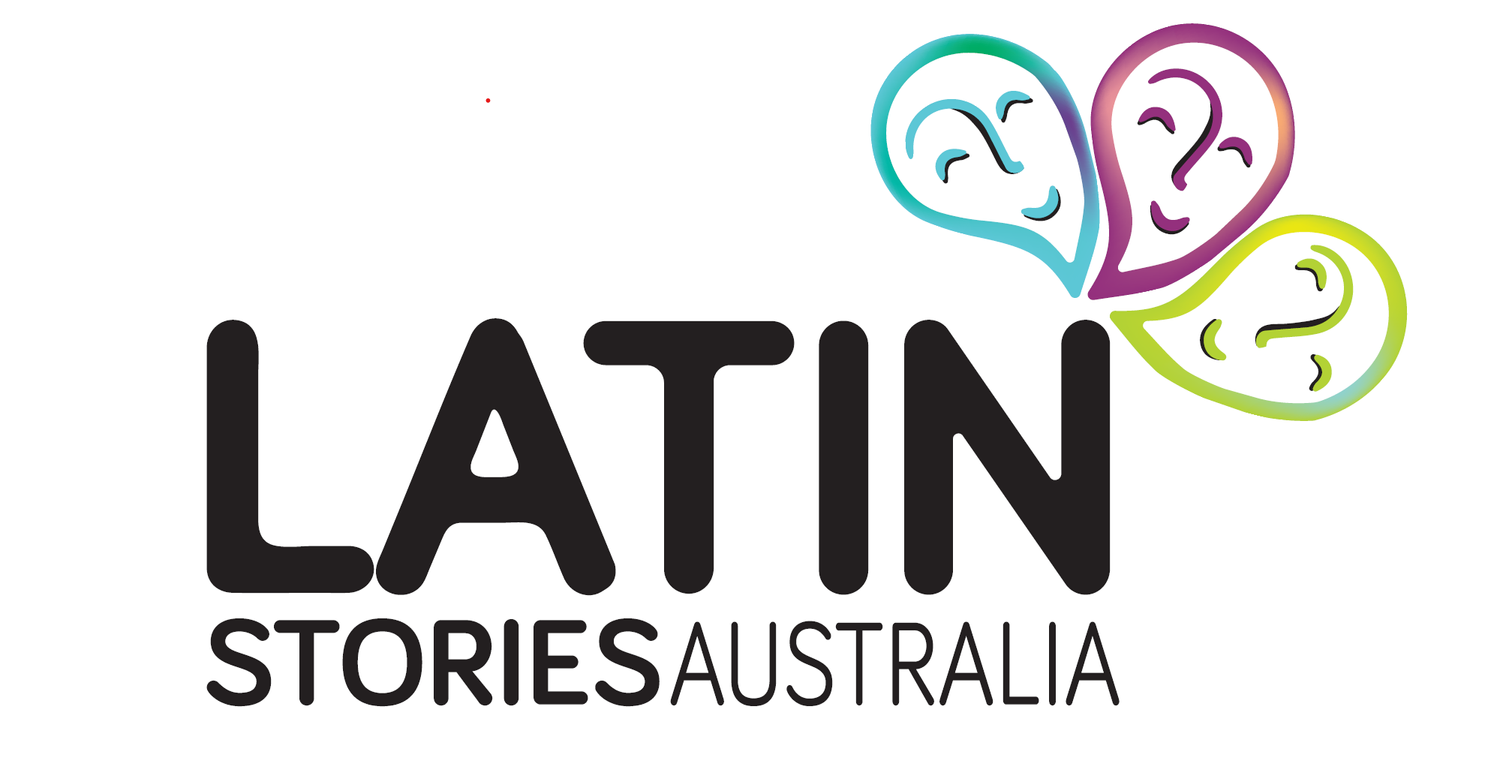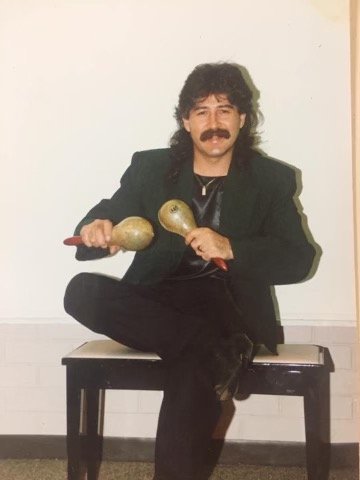Fernando Gallardo
“Even though I have adjusted to life here. I don’t feel like I have changed much as a person. I have maintained everything that is related to my culture and that forms who I am.”
Fernando Gallardo
Country of origin: Chile.
Occupation: Musician. State of residency: VIC. Favourite place in Australia: Wilson Promontory, where I have had unforgettable moments with family and friends. Upon arrival: Surprised by the tranquillity and the fact that the shops and commerce close very early.
This story is part of “Nuestras Voces”
Interviewed by Trini Abascal. Translated from Spanish by Claire Bower. Edited by Zoe Gleeson.
As an active youth protestor against the Pinochet dictatorship, Fernando Gallardo’s safety became compromised after a violent altercation at the hands of the police. With no choice but to flee, Fernando arrived in Australia in 1984 under the family reunion visa. Music was and continues to be Fernando’s way to connect with people in Australia, pay homage to his home country and culture and make his mark. He is one of the pioneers of Latin American music in Australia. He has participated in many famous festivals around Australia and his music been very well received by the Australian community. Currently, he is the singer in the group called “Bahía” one of the original and first Salsa bands in Australia.
TELL US YOUR STORY
I left Chile in 1984. At that time, Chileans were fighting back against the dictatorship in the country and there were many protests. I was in my youth, and I became involved in these massive social demonstrations. In a confrontation with Carabineros (Chilean Police) I was arrested and punished violently inside a police bus in operation. After hours of being beaten and repressed, they released me, semi naked, in a dark and isolated rural street near Santiago.
The Vicarage of Solidarity, a catholic church organisation, helped and represented me in a trial against government police forces. As I was part of this trial, my integrity was no longer safe.
My then wife had family in Melbourne, so we decided to move here. I was able to choose which visa program I would apply to, either through the family reunion visa or as a refugee. I wasn’t concerned about which type of visa, the most important thing was that I could make it to Australia. I ended up deciding to apply through the family visa.
When I first got off the plane in Melbourne in 1984, I felt a mixture of emotions: happy as there were family and friends waiting for us at the Melbourne airport, however, at the same time, sadness for having left the rest of my big family and country behind. Most importantly, I felt filled with hope for a new start in life. I never had the intention of leaving my country, I told myself I would go to Australia for a few years, get some savings, and then return to Chile. I ended up staying in Australia as my second child was born in Melbourne in 1986 and my third one in 2003 at the Monash Hospital in Clayton. I was working and establishing a home for my family and eventually I realised I had put my roots down and that Australia was where we would stay. We returned to Chile for the first time for a holiday nine years after leaving.
My wife’s family helped me integrate. They wanted to make sure that I could find work as soon as possible. They helped me find my first job in the Nissan Factory, manufacturing cars in Clayton South. By my second week in Australia, I was working on the production line in the factory. I met a lot of other Chileans and Latinos on the job. Beyond this work, one of my main ways of adapting to Australian life was through music and my identity became that of a singer and musician. In my first week in Melbourne, I recorded a demo “I just called to say I love you” with my then father-in-law (RIP), we used a backing track and recorded the singing over the top. We then sent the recording to one of the first Latin bands in Australia “Sonido Latino” which at the time was the first introduction to Latin American music in Australia. We showed them the demo and they were very impressed, and we began to rehearse.
I had come from Chile with a repertoire of ballads, folk, and protest songs. While dictatorships were in power in several Latin American countries, I was able to perform these songs in “peñas” (a meeting place or gathering of musicians or artists) and political events here in Melbourne. As soon as democracy was back in Latin America, this music was not relevant to the context anymore.
Sonido Latino
Fernando’s first Banda in Australia
I began performing a new genre of music, Salsa, Boleros and danceable Latin grooves with different Latin orchestras, and had the opportunity to perform both in Australia and internationally in Singapore and New Caledonia. In Australia, we played our music at many famous festivals around Melbourne including Moomba in St Kilda as well as festivals in regional cities such as Geelong, Ballarat, Bendigo, Wodonga, Yackandandah and many more.
We also performed in many other cities and towns including Sydney, Perth, Byron Bay, Queensland. There was a time when we were performing almost every weekend, we had a lot of work as Latin music was really popular at that point (mainly in the 90’s). It usually coincided with when famous international Latin artists like Julio Iglesias and the Gypsy Kings released new music to the world. It is really satisfying to have performed at some of these festivals. I feel like I have contributed by sharing our music with people.
Nowadays, I am the Singer in the group called “Bahía” one of the original and first Salsa bands in Australia. I feel content having now performed various musical genres including the Salsa, Tango, ballads and Folk music. I have contributed music to the Latin American people, who, like me, have emigrated and are making their lives in other countries. I feel proud to be able to share my culture with others through music. I am also very proud of my children. Whilst it is comforting to me that my children have adapted well to living in Australia and that they feel that Australia is their home, I have always been keen for them to maintain their connection to their Chilean culture and their Chilean family.
CHALLENGES
Introducing their music to the Australian public, 1988
Awareness of our music - Latin music was not very well known at the time. It used to annoy me that people would ask where I was from and when I would tell them Chile, they did not know much about my country. In the 1990s, people became more aware of Chile at an international level. Latin music was well received by the Australians and the orchestra performed at many local venues for more than six years which always brought a mix of Latinos and Australians. Nowadays Latin music seems to have a lot of traction among the Australian people, it appears to bring them a lot of happiness. Latin American music has had a big impact on the Australian people, but I don’t know if it has ever been recognised like that.
Nostalgia for Chile - It has always been a constant challenge to adapt to Australia, and nostalgia is a permanent feature; I always think of my mother, father, siblings and friends in Chile.
Language and cultural barriers - I always had the intention to learn English, to try and adapt well to life in Australia but I actually found it really difficult to learn properly. It took between 3-5 years for me to feel that I fitted into the city. I was always much more connected to my community [the Latin American community]. It has been hard to adapt to the Australian idiosyncrasies, music, sense of humour and way of being. During my first years in Australia, I never felt comfortable socialising with someone and not being able to communicate myself fully. It was a struggle to not be able to converse with the Australian people in a direct or frank way as one would do if they were speaking in their native language. In more recent years I have felt as though I am much more comfortable and at ease in Australian culture. I interact with anybody without too much effort or without the cultural differences being too obvious.
CONTRASTS
Social life - It was a real shock when I arrived that everything was closed by 11pm, the only thing that was open was 7/11. It was dead. Little by little it began to change and started to be influenced by Europe. I was young at the time; it was shocking to not be able to go out to clubs or pubs in the evenings or on weekends. The nights were really boring. We had to learn to socialise with the older Latino people and go along with their activities.
Nature - My first impression when arriving in Australia was the thriving and healthy nature, it really impressed me. In Chile due to the constant fighting and protests, nature was not well preserved.
PIECE OF ADVICE
Work on your mindset - The cultural shock may be big and difficult at the beginning. My advice is to cultivate a positive and strong mindset to be able to work consistently to build up a life here. I believe that the best age to migrate is under 40 years old, older than that and it could be significantly more challenging.
Learn as much English as you can - The language is perhaps the most important key to success in this country. If you have intentions to migrate to Australia, learn the maximum amount of English you can before arriving.
Do not give up - If you are having difficulties, there is a lot of support in Australia from the Government and community organisations. But do not give up!
IN THE NEXT FEW YEARS…
“Bahia” music group at the Bendigo Festival, 2018
Fernando would like to keep getting involved in activities with the Latin American community, work with the elderly, and collaborate and continue to contribute to society. He would also like to do more travel including visiting his home country more often.





